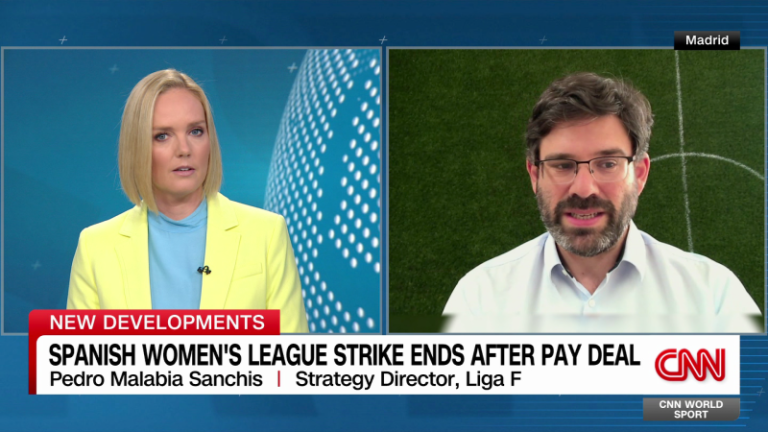Players competing in the top-tier of women’s football in Spain – Liga F – have called their strike off after reaching a minimum pay agreement, players’ union FUTPRO announced on Thursday.
The dispute between the five unions representing the players – including many of Spain’s World Cup-winning squad – and Liga F primarily came about because of a disagreement in the minimum salary for players and the wage gap which exists.
The players initially asked for a minimum salary of €23,000 (about $24,600) to be introduced for the upcoming season, rising to €25,000 (about $26,750) for next season.
The unions originally called for two weeks of strike action encompassing the first two matchdays of the new Liga F soccer season, but have now agreed to return following one week of strikes.
“The agreements consist of a minimum salary of €21,000 (about $22,544) for the 2023/24 season, €22,500 (about $24,153) for 2024/25 and €23,500 (about $25,223 for 2025/26,” FUTPRO said in a statement.
“These amounts could reach €23,000 (about $24,689) for the 2023/24 season, €25,000 (about $26,834) for 2024/25 and €28,000 (about $30,054) for 2025/26, based on the profits obtained for commercial activities and other commercial sources of income proposed by the unions, like matches played for a national team by first division players.”
‘They do not want equal payment’
“If we need to understand and compare this minimum salary, we need to also compare the incomes and when it comes to men’s football in La Liga, it’s [two billion] euros per year, only in TV rights, against six million euros that we have in Liga F.
He added: “It’s absolutely impossible to sustain this equal payment if the incomes are not equal. This is a thing that players understand, absolutely.
“They do not want equal payment. What they want is equal opportunities of growth. And I think this is no issue with the players in Spain. Trust me.”
His comments mirror those made by Keka Vega, the women’s football coordinator of the Spanish Footballers’ Association (AFE) union, who said, per Reuters: “First of all, it was the women players who said that they were not looking for equal pay.
“The difference, as you have rightly said, is huge […] what we have to work on as trade unions and the women soccer players, what they are demanding, is to reduce this pay gap.”
When asked how long he thinks it will take until pay parity is reached, Malabia said it was difficult to predict while the difference in league revenues remains so large.
“I believe women’s football is on the right track. I believe the value of women’s football is so high,” he added.
“We believe all of the scenarios of stability, of the World Cup, of being the world champions and of the big talent of our players and clubs, hopefully within the next year, we will experience a big growth.”
According to FUTPRO, the minimum pay agreement is the first step in a more comprehensive collective bargaining agreement and work was needed to “advance on very important points like maternity, harassment protocols, compensation lists and others which we consider equally as important for the correct development of the activity of our footballers.”
The deal comes against the backdrop of Spain’s Women’s World Cup success and the fallout of the unwanted kiss from Luis Rubiales, the former president of the country’s soccer federation, to La Roja star Jennifer Hermoso.
Ex-Royal Spanish Football Federation (RFEF) president Rubiales is set to testify in Spain’s National Court on Friday after being summoned by the presiding judge to aid in the court’s investigation into potential charges of sexual assault and coercion against him.
Rubiales resigned from his position on Sunday following weeks of pressure from all spheres of Spanish society.
The 2023/24 Liga F season gets underway on Friday with Valencia hosting Real Madrid.

